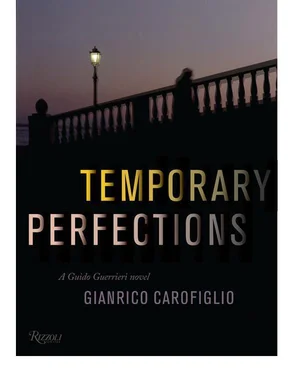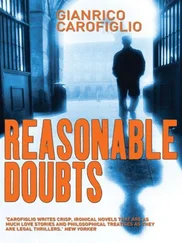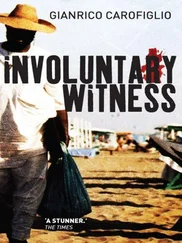Gianrico Carofiglio - Temporary Perfections
Здесь есть возможность читать онлайн «Gianrico Carofiglio - Temporary Perfections» весь текст электронной книги совершенно бесплатно (целиком полную версию без сокращений). В некоторых случаях можно слушать аудио, скачать через торрент в формате fb2 и присутствует краткое содержание. Жанр: Криминальный детектив, на английском языке. Описание произведения, (предисловие) а так же отзывы посетителей доступны на портале библиотеки ЛибКат.
- Название:Temporary Perfections
- Автор:
- Жанр:
- Год:неизвестен
- ISBN:нет данных
- Рейтинг книги:3 / 5. Голосов: 1
-
Избранное:Добавить в избранное
- Отзывы:
-
Ваша оценка:
- 60
- 1
- 2
- 3
- 4
- 5
Temporary Perfections: краткое содержание, описание и аннотация
Предлагаем к чтению аннотацию, описание, краткое содержание или предисловие (зависит от того, что написал сам автор книги «Temporary Perfections»). Если вы не нашли необходимую информацию о книге — напишите в комментариях, мы постараемся отыскать её.
Temporary Perfections — читать онлайн бесплатно полную книгу (весь текст) целиком
Ниже представлен текст книги, разбитый по страницам. Система сохранения места последней прочитанной страницы, позволяет с удобством читать онлайн бесплатно книгу «Temporary Perfections», без необходимости каждый раз заново искать на чём Вы остановились. Поставьте закладку, и сможете в любой момент перейти на страницу, на которой закончили чтение.
Интервал:
Закладка:
On the other hand, the cell phone records seemed to rule out Michele Cantalupi’s involvement in Manuela’s disappearance. First of all, it was clear that for several days, his phone had been routed through foreign cell networks, so he really had been out of the country. Second, there was no contact-that Sunday or in the days before that-between Manuela and her ex-boyfriend.
Manuela’s cell phone didn’t seem to get a lot of use. The cell phone records covered the week prior to her disappearance: only a few calls and a few text messages, all to girlfriends or to her mother. None of the numbers belonged to anyone outside of her small circle of friends. Nothing unusual, except perhaps for how few calls and messages there were. Taken alone, however, that was not particularly significant.
That Sunday, Manuela had received only two phone calls, and she had exchanged text messages, again, with her mother and with a girlfriend. The last sign of life in the phone records was a text message she sent to her mother in the afternoon. After that, nothing. The cell phone went dead for good.
Her friend was interviewed by the Carabinieri, but she’d been unable to supply any useful information. She’d called Manuela to say hello, since she had to go back to Rome and they hadn’t had a chance to get together in the previous few days. She had no idea what Manuela was planning to do that evening, how she would be getting back to Rome, much less what might have happened to her.
The ATM records provided nothing useful, since the last withdrawal had been made in Bari on the Friday before she disappeared.
In the days that followed, a number of photographs of Manuela, with a description of the clothing she was probably wearing that afternoon, were published in local newspapers and shown on the television program Chi l’ha visto?. Some of those photographs were in the file. I looked at them for a long time, searching for a secret, or at least an idea of some kind. Of course, I found nothing, and the only brilliant conclusion that I managed to draw from my examination was that Manuela was-or had been-a very attractive young woman.
After the photographs were published, as Fornelli had told me and as always seems to happen with disappearances, a number of people-nearly all of them of good candidates for psychiatric treatment-had phoned in and claimed to have seen the missing girl.
The third report showed the effects that publishing the photographs had on an array of mentally unbalanced individuals. There were a dozen or so statements sent from Carabinieri stations all over Italy. They were all declarations from people who claimed, in varying tones of confidence, which in turn correlated exactly to how precarious their mental health was, that they had seen Manuela.
There was the pathological liar Fornelli had mentioned to me who claimed he’d seen Manuela working as a prostitute on the outskirts of Foggia. Then there was a woman who noticed Manuela wandering absentmindedly through the aisles of a superstore in Bologna. There was a guy who swore he’d seen her in Brescia, flanked by two suspicious-looking men who spoke some Eastern European language. They had shoved Manuela into a car, which tore away, tires screeching.
The Carabinieri noted that none of these statements appeared to possess even a shred of credibility. As I read, I thought to myself that I had rarely agreed so wholeheartedly with a police document.
Also in the file were a number of anonymous letters that had been sent directly to the district attorney’s office. They spoke, variously, of the white slave trade, international conspiracies, Turkish and Israeli intelligence agencies, satanic cults and black masses. I forced myself to read them all, from start to finish, and I emerged from that experience exhausted, dispirited, and with absolutely nothing to show for it.
Manuela had been sucked silently into a vacant and terrifying vacuum on a late-summer Sunday, and I could think of nothing more that might be done to keep alive the desperate hopes of her parents.
I walked over to the fridge and poured myself another glass of wine. I looked back over the few notes I’d jotted down and decided they were useless.
My nerves were on edge, and I seemed unable to control my thoughts. I wondered what the private investigators and police detectives from some of the many American crime novels I’d read over the years would have done in my situation. For instance, I tried to imagine what Matthew Scudder, or Harry Bosch, or Steve Carella would do if he were assigned to this case.
The question was ridiculous, and yet, paradoxically, it helped me focus my thoughts.
The investigator in a crime novel, without exception, would begin by talking to the policeman who conducted the investigation. They would ask him what ideas he might have developed, independently of what he’d written in his reports. Then they would contact the people who’d already been questioned and try to extract some detail that they’d overlooked, or forgotten, or failed to mention, or that simply hadn’t made it into the report.
It was just then that I realized something. A couple of hours earlier, I had assumed that when I read the file, I wouldn’t find any new clues. And in fact, reading the file had only confirmed my suspicions. But I also assumed that I would then report my findings to Fornelli and the Ferraros, return their check, and get myself out of an assignment that I had neither the skills nor the resources to take on. It would be the only right and reasonable course of action. But in that two-hour period, for reasons I could only vaguely guess at and that I didn’t want to examine too closely, I had changed my mind.
I told myself I’d give it a try. Nothing more. And the first thing I’d do would be to talk to the non-commissioned officer who had supervised the investigation, Inspector Navarra. I knew him. We were friends, and he would certainly be willing to tell me what he thought of the case, aside from what he’d written in his reports. Then I’d decide what to do next, what else to try.
As I walked out onto the street, with a studied gesture I pulled up the collar of my raincoat, even though there was no reason to do so.
People who read too much often do things that are completely unnecessary.
9.
On my way home, I decided to put in half an hour on my punching bag. The idea, as always, made me slightly giddy. I think it might be interesting for a skilled psychologist to spend some time studying my relationship with the heavy bag. Obviously, I punch it a lot. But before I get started, in the pauses between rounds, and especially afterward, perhaps while drinking a cold beer or a glass of wine, I talk to it.
This began when Margherita left for New York, and it got more serious when she wrote to say that she wasn’t planning to come back to Italy. That letter-a genuine letter on paper, not an e-mail-certified what I already knew: It was over between us, and she now had another life, in another city, in another world. That left me with the crumbs of our old life, in our old city, in our old world. In the months that followed, what I talked about most of all to him-to the punching bag, I mean-was Margherita and the other women I’ve loved. Three in all.
“You know, friend, what strikes me as especially sad?”
“-”
“I no longer remember the devastating feeling that I experienced, albeit differently, with Tiziana, Margherita, and Sara. I just can’t seem to remember it. I know I felt it, but I have to work to convince myself of that, because I have no memory of it. It’s gone.”
Mister Bag swung from side to side, and I understood he wanted an explanation. I probably hadn’t described it well. What did I mean when I said that I couldn’t remember that devastating feeling?
Читать дальшеИнтервал:
Закладка:
Похожие книги на «Temporary Perfections»
Представляем Вашему вниманию похожие книги на «Temporary Perfections» списком для выбора. Мы отобрали схожую по названию и смыслу литературу в надежде предоставить читателям больше вариантов отыскать новые, интересные, ещё непрочитанные произведения.
Обсуждение, отзывы о книге «Temporary Perfections» и просто собственные мнения читателей. Оставьте ваши комментарии, напишите, что Вы думаете о произведении, его смысле или главных героях. Укажите что конкретно понравилось, а что нет, и почему Вы так считаете.












